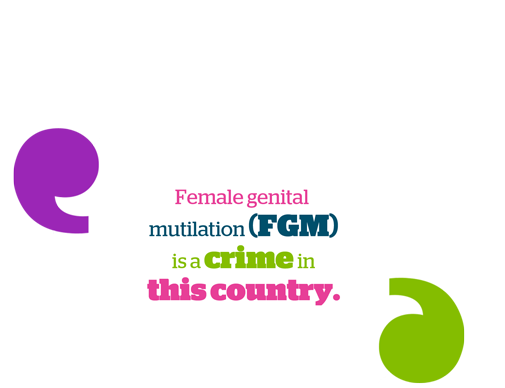Female genital mutilation (FGM) is a
crime in this country. It is also a
crime to take a British national or
permanent resident abroad for FGM
or to help someone trying to do this.
Girls may be taken to their countries
of origin so that FGM can be carried
out during the summer holidays,
allowing them time to ‘heal’ before
they return to school. There are also
worries that some girls may have
FGM performed in the UK.
FGM refers to all procedures involving
partial or total removal of the external
female genitalia or other injury to the
female genital organs for cultural or
other non-medical reasons. FGM has
serious implications for the sexual
and reproductive health of girls and
women.
The effects of FGM depend on a
number of factors, including the type
performed, the expertise of the
practitioner, the hygiene conditions
under which it is performed, the
amount of resistance and the general
health condition of the girl
undergoing the procedure.
Complications may occur in all types
of FGM. Immediate complications
include severe pain, shock,
haemorrhage, tetanus or infection,
urine retention, ulceration of the
genital region and injury to adjacent
tissue, wound infection, urinary
infection, fever, and septicaemia.
Haemorrhage and infection can be
severe enough to cause death.
"FGM procedures can also cause
many psychological problems as
well as problems with giving birth
later in life - including the death of
the baby."
There are no health benefits to FGM.
Removing and damaging healthy
and normal female genital tissue
interferes with the natural functions
of girls' and women's bodies.
It may be difficult to talk about the
issue, but it is important to tell
someone that this has happened to
you, or that you think it may happen
to yourself or someone you know.
"FGM is illegal in the UK and is
considered a human rights
violation and a form of child
abuse."
FGM is often performed on girls
between the ages of five and eight.
However FGM can be performed on
babies, teenagers, and sometimes
even on adult women. The age differs
from community to community.
- 60,000 girls under 15 are at risk of
FGM in the UK.
- 137,000 girls and women are living
with the consequences of FGM in
the UK.
If you think you or another girl or
woman is at risk of FGM it is
important to speak up now. If there is
immediate risk call the police on 999.
If the girl or woman has already been
taken abroad, you should phone the
Foreign and Commonwealth Office
on 020 7008 1500.
NSPCC have a helpline dedicated to
FGM that is anonymous and open
24/7, you can call them on
0800 028 3550.
Your Local Social Services
Department will be able to protect
you or provide support, you can
contact them through your local
council www.gov.uk/find-your-localcouncil
Your Local Police Child Protection
Unit will be able to protect you or
provide support, you can contact
them through your local police
station.
For more information on services
available and one-to-one support
you can call FORWARD on
0208 960 4000. We are open
Monday to Friday from 9:30 am to
5:30 pm or email us at
support@forwarduk.org.uk
"In the UK the FGM Act (2003)
makes it illegal to help, support or
arrange for FGM to be performed
on a girl either in the UK or
abroad."
The offence can be punished by up
to 14 years in prison, a fine, or both.
Without engagement with affected
communities to abandon FGM, laws
alone will not be enough to end this
practice.






